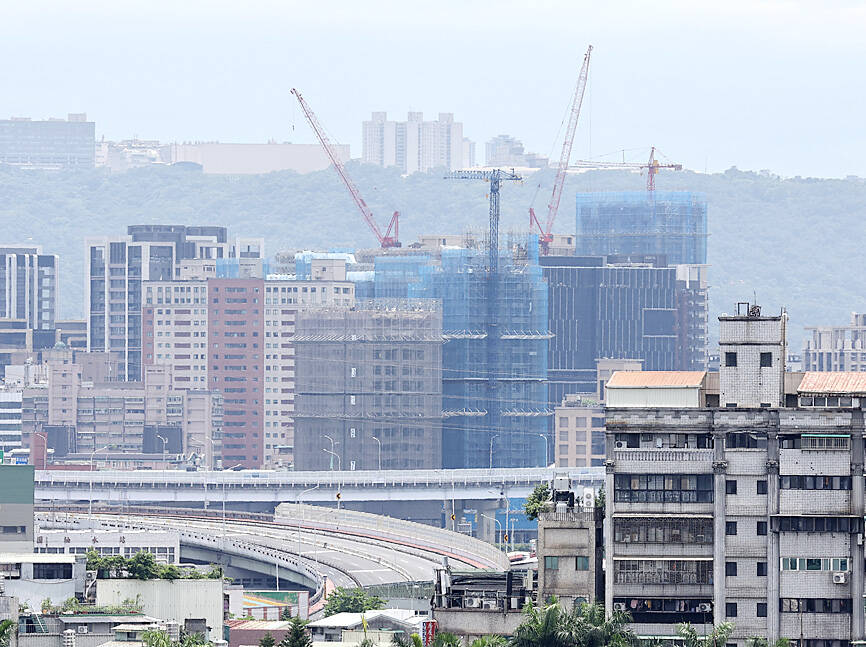The climate monitor for the presale and new housing market in northern Taiwan last month held steady for a 15th straight month, but approached the brink of a slowdown amid tepid new project launches and buying interest, My Housing Monthly has found.
The reading came in at 42.2, dropping 3.9 points from one month earlier and coming close to the threshold of 42 that indicates a sluggish state, the Chinese-language research publication said in a report released on Thursday.
“The market has a slim chance of improving this month as political uncertainty linked to the elections of local administrators and councilors dominates public attention,” My Housing Monthly research manager Chen Tsai-chi (成采錡) said.

Photo: CNA
Presale housing projects last month totaled NT$50 billion (US$1.55 billion), but only a few met the NT$1.5 billion threshold to qualify as large project launches, Chen said.
In Taipei, only three projects — two in Beitou District (北投) and one in Nangang District (南港) — met the criteria.
In New Taipei City, five projects in Banciao (板橋), Sanchong (三重), Sindian (新店), Linkou (林口) and Taishan (泰山) districts passed the threshold, it said.
Three projects in Taoyuan and one in Hsinchu also qualified.
At the same time, the market saw the entry of 100 newly completed apartment units, with only one building in Taipei’s Zongshan District (中山) valued at more than NT$1.5 billion, it said.
The data showed that developers sought to cope with listless sales by slowing the supply rather than cutting prices to facilitate transactions, Chen said.
Sales rates fell from 7.04 to 5.63, with 1.6 deals closed per week, compared with 2.1 in September, it said.
The reading on price concessions stood at 8.89, the same as one month earlier, with the room for price bargaining averaging 10.41 percent for presale projects, it said.
Housing reception sites saw fewer potential buyers at about 21.9 people per week, compared with 23.8 people one month earlier, it said, adding that heavy rainfall last month contributed to cooling buying interest.
Asking prices played an important role in determining buying interest, Chen said, adding that Taipei’s unaffordable housing prices scared away many prospective buyers.
Some reception sites in the capital saw no visitors at all, but suburban districts Beitou and Neihu proved the exception because of their relatively friendly asking prices, he said.

KEEPING UP: The acquisition of a cleanroom in Taiwan would enable Micron to increase production in a market where demand continues to outpace supply, a Micron official said Micron Technology Inc has signed a letter of intent to buy a fabrication site in Taiwan from Powerchip Semiconductor Manufacturing Corp (力積電) for US$1.8 billion to expand its production of memory chips. Micron would take control of the P5 site in Miaoli County’s Tongluo Township (銅鑼) and plans to ramp up DRAM production in phases after the transaction closes in the second quarter, the company said in a statement on Saturday. The acquisition includes an existing 12 inch fab cleanroom of 27,871m2 and would further position Micron to address growing global demand for memory solutions, the company said. Micron expects the transaction to

Vincent Wei led fellow Singaporean farmers around an empty Malaysian plot, laying out plans for a greenhouse and rows of leafy vegetables. What he pitched was not just space for crops, but a lifeline for growers struggling to make ends meet in a city-state with high prices and little vacant land. The future agriculture hub is part of a joint special economic zone launched last year by the two neighbors, expected to cost US$123 million and produce 10,000 tonnes of fresh produce annually. It is attracting Singaporean farmers with promises of cheaper land, labor and energy just over the border.

US actor Matthew McConaughey has filed recordings of his image and voice with US patent authorities to protect them from unauthorized usage by artificial intelligence (AI) platforms, a representative said earlier this week. Several video clips and audio recordings were registered by the commercial arm of the Just Keep Livin’ Foundation, a non-profit created by the Oscar-winning actor and his wife, Camila, according to the US Patent and Trademark Office database. Many artists are increasingly concerned about the uncontrolled use of their image via generative AI since the rollout of ChatGPT and other AI-powered tools. Several US states have adopted

A proposed billionaires’ tax in California has ignited a political uproar in Silicon Valley, with tech titans threatening to leave the state while California Governor Gavin Newsom of the Democratic Party maneuvers to defeat a levy that he fears would lead to an exodus of wealth. A technology mecca, California has more billionaires than any other US state — a few hundred, by some estimates. About half its personal income tax revenue, a financial backbone in the nearly US$350 billion budget, comes from the top 1 percent of earners. A large healthcare union is attempting to place a proposal before